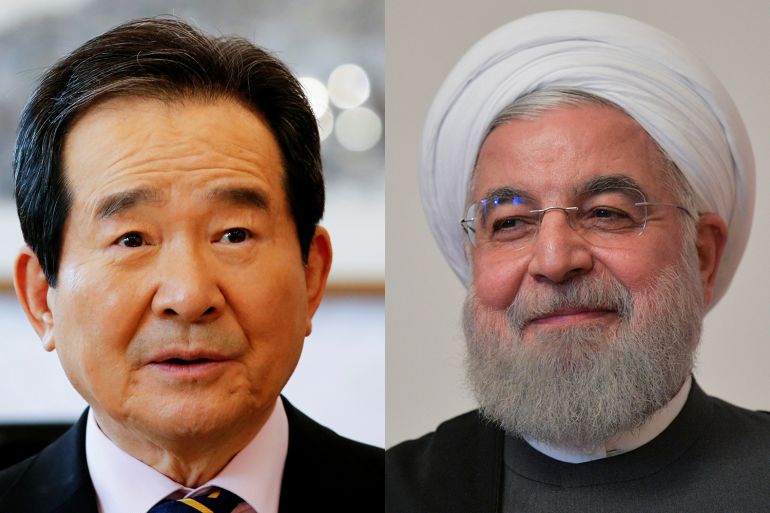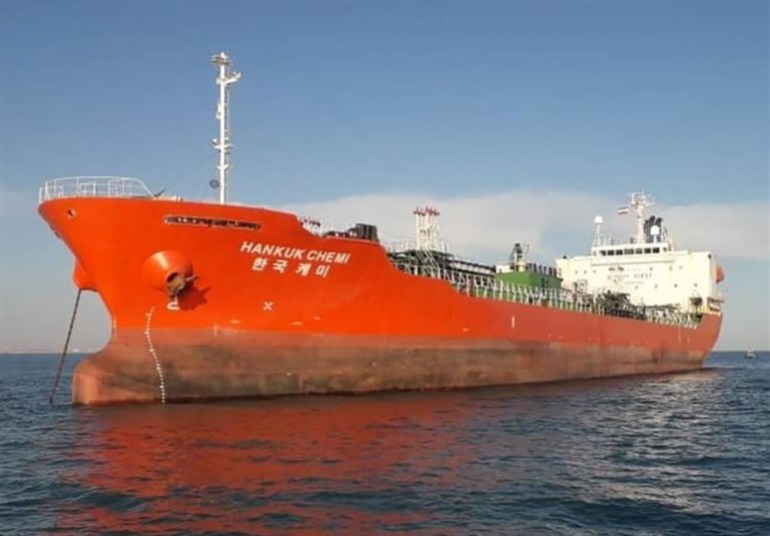Future ties at stake as South Korean PM visits Iran
Billions of dollars of Iranian money continues to be frozen in South Korean banks as its prime minister visits Tehran for top-level talks.

Tehran, Iran – The future of diplomatic and financial relations between Iran and South Korea is at stake as Prime Minister Chung Sye-kyun visits Tehran for three days of talks.
South Korea has for years blocked at least $7bn of Iranian money in its banks as it fears falling afoul of harsh economic sanctions the United States started unilaterally imposing on Iran in 2018.
Keep reading
list of 4 itemsIran releases seized South Korean tanker
Iran tests newest advanced nuclear centrifuges
Iran calls blackout at Natanz atomic site ‘nuclear terrorism’
The money, mostly yields from exported Iranian oil, was central to talks between Chung and First Vice President Es’haq Jahangiri on Sunday.
In a joint press conference in Tehran, Jahangiri called for the release of the funds.
“South Korean banks’ move to block Iran’s foreign currency reserves comes as the Iranian nation severely needs them due to conditions created by the coronavirus and its economic and health ramifications,” he told reporters while standing behind a podium next to Chung.
Chung is also expected to meet Parliament Speaker Mohammad Bagher Ghalibaf, supreme leader’s adviser Ali Larijani, and President Hassan Rouhani during the trip.
Iranian officials’ repeated harsh criticism of South Korea and threatening legal action for refusing to release the money has led to no results so far, but the talks are hoped to provide a breakthrough.
Iran was accused of hostage-taking when it seized a South Korean vessel in January for “environmental pollution” in its waters.
Iranian authorities denied the charges and accused South Korea of taking the country’s money hostage, urging them to allow its judiciary to investigate the issue.
The ship, the Hankuk Chemi, was released on Friday along with its captain.

In late February, the governor of the central bank of Iran, Abdolnasser Hemmati, announced after a meeting in Tehran with South Korea’s ambassador, Ryu Jeong-hyun, that Seoul had agreed to release “a part” of the money, which was later said to amount to $1bn.
Reports indicated the money was directed to a Swiss financial humanitarian channel set up towards the end of Donald Trump’s presidency to ensure US sanctions do not affect Iran’s humanitarian trade, but only a single transaction was conducted and it has been inactive during the Joe Biden administration.
It was said to be aimed at buying medical equipment and vaccines as Iran continues to grapple with the deadliest COVID-19 pandemic in the Middle East.
However, South Korea later said the money could only be released if the Office of Foreign Asset Control (OFAC) of the US Treasury Department issues a permit, something that has yet to happen.
The money appears to be closely tied to the fate of the Joint Comprehensive Plan of Action (JCPOA), Iran’s 2015 nuclear deal with world powers that the US unilaterally abandoned in May 2018.
The remaining JCPOA participants – Iran, China, Russia, Germany, France, and the United Kingdom – on Friday concluded the opening week of what they said were “constructive” talks to restore the accord in Vienna.
Representatives from the US were also in town, but in a separate hotel as Iran asserts it will not directly meet American officials until their crushing sanctions are lifted.
At the press conference on Sunday, the South Korean prime minister said since nuclear talks in Vienna appear to be progressing well, the two countries should prepare to boost their ties for when US sanctions are lifted.
“I wanted my trip to Tehran to represent South Korea’s strong will to advance a two-sided vision toward the future of relations with Iran,” Chung said, also inviting Jahangiri to visit South Korea.
He also said the two countries will look toward actions that are not prohibited by US sanctions.
“Through a working group, humanitarian trade of medicine and medical equipment between Iran and South Korea will expand. I hope this helps the Iranian people,” he said.
Days before the talks began, reports said the US had offered to release $1bn of the Iranian money in South Korea in exchange for Iran stopping its 20 percent enrichment of uranium, an offer that was resoundingly rejected by Tehran.
LG and Samsung
Prior to US sanctions, South Korean technology giants LG and Samsung had a significant foothold in the Iranian home-appliance market.
But Iranian officials have made a point of stressing that brands that chose to leave the country in light of US sanctions will not be easily allowed back when pressures ease.
When a South Korean delegation led by Vice Foreign Minister Choi Jong-kun was in Tehran in January to discuss the seized vessel, the diplomat was told the country’s brands could expect a tough future in Iran.
“South Korean companies have lost good opportunities in Iran in recent years,” said Kamal Kharazi, head of the Strategic Council on Foreign Affairs, at the time, adding Tehran has learned to rely on its local manufacturing.
“Even if relations between the two countries are normalised in the future, South Korean companies would have to think about investments, transfer of technical knowledge, and participation in manufacturing rather than selling their goods.”
Earlier this week, the judicial deputy of Iran’s attorney general, Saeed Omrani, said LG and Samsung “abandoned the Iranian people in harsh conditions” and will therefore not be legally allowed to return to the country in the future.